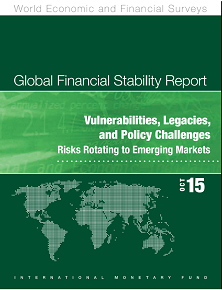Dias, Daniel A., Wright, Mark L. J., (2015), “Alternative measures of government indebtedness”,Voxeu, 13 Νοεμβρίου. Measured as a percentage of its GDP, Greece’s debt is higher than that of Portugal and Ireland. This column discusses a range of new techniques for measuring the debts of Greece, Ireland, and Portugal. It argues that plausible alternative measures of indebtedness suggest that Greece is anywhere from as much as 50% more indebted than Portugal and …Read More
The limitations of policy coordination in the euro area under the European Semester
Darvas, Zsolt, Leandro, Álvaro, (2015), “The limitations of policy coordination in the euro area under the European Semester”, Bruegel Publications, Issue 19, 12 Νοεμβρίου. This paper assesses economic policy coordination in the euro area under the European Semester. In sections 2 and 3, we make a positive (and not normative) assessment by taking Council recommendations made in the context of the European Semester as given and evaluating their implementation and consistency, without assessing …Read More
Is globalisation reducing the ability of central banks to control inflation?
Claeys, Grégory, Wolff, Guntram B., (2015), “Is globalisation reducing the ability of central banks to control inflation?”, Bruegel Publlications, Issue 18, 12 Νοεμβρίου. After soaring in the 1970s and early 1980s, inflation has declined significantly in all advanced countries and is now at very low levels.This movement coincided with the acceleration of globalisation, triggering a recent debate on whether globalisation could be one of the main drivers of the disinflation process, and …Read More
Charting public opinion on the future of the welfare state
Hüttl, Pia,Wolff, Guntram, (2015), “Charting public opinion on the future of the welfare state”, Bruegel Publications, 10 Νοεμβρίου. As part of the of the Vision Europe Summit, a survey was held between July and August 2015 to gauge public opinion on the welfare state after the crisis. The survey revealed citizens’ general confidence in the welfare state, as well as preferences regarding the welfare state’s future goals and financing. We discuss the …Read More
The Growing Intergenerational Divide in Europe
Hüttl, Pia, Wilson, Karen, Wolff, Guntram, (2015), “The Growing Intergenerational Divide in Europe”, Bruegel Publications, Issue 17, Νοέμβριος. During seven years of economic crisis, the intergenerational income and wealth divide has increased in many European Union countries. In the bloc as a whole, young people on average have become significantly poorer, while poverty among pensioners has been reduced (Figure 1). Unemployment among the under-25s has risen notably while older workers (aged 5-64) have been less …Read More
The macroeconomic effects of the Eurozone’s fiscal consolidation
Rannenberg, Ansgar, Schoder, Christian, Strasky, Jan, (2015), “The macroeconomic effects of the Eurozone’s fiscal consolidation”, Voxeu, 11 Νοεμβρίου. From 2011 to 2013, fiscal policy in the Eurozone turned progressively more restrictive. This column argues that output cost of fiscal consolidation strongly depends on presence and strength of credit constraints. With credit constraints both in the household and the firm sector, fiscal consolidation would be largely responsible for the weak growth performance during 2011-2013. …Read More
Global Financial Stability Report-October 2015
International Monetary Fund, (2015), “Global Financial Stability Report October 2015 – Vulnerabilities, Legacies, and Policy Challenges Risks Rotating to Emerging Markets”, World Economic and Financial Surveys, Οκτώβριος. During the past six months financial stability has improved in advanced economies, but risks continue to rotate toward emerging markets amid a lower risk appetite and higher market and liquidity risks. In advanced economies, growth is gaining traction, and monetary policy normalization is approaching in …Read More
Short-sighted monetary policy and fear of liftoff
Orphanides, Athanasios, (2015), “Short-sighted monetary policy and fear of liftoff”, Voxeu, 11 Νοεμβρίου. There is generally consensus among macroeconomists that monetary policy works best when it is systematic. Following the financial crisis, the Federal Reserve Bank of the US shifted from long-term, systematic policy to short-term goals targeting unemployment. This column argues that, while these were appropriate in the aftermath of the downturn, such policy accommodations have been pursued for too long …Read More
External imbalances within the Eurozone: The Dutch disease explanation
Sy, Mouhamadou, (2015), “External imbalances within the Eurozone: The Dutch disease explanation”, Voxeu, 9 Νοεμβρίου One of the most prominent features of the Eurozone Crisis has been the large current account deficit accumulated by countries at the periphery relative to those at the core (Baldwin and Giavazzi 2015). These imbalances (see Figure 1) are commonly attributed to differences in competitiveness as manifested in persistent differences in the unit labour costs, …Read More
Has the crisis affected the behavior of the rating agencies?-Panel Evidence from the Eurozone
Boumparis, Periklis, Milas, Costas, Panagiotidis, Theodore, (2015), “Has the crisis affected the behavior of the rating agencies?-Panel Evidence from the Eurozone”, University of Macedonia, Discussion Paper No. 4/2015, Νοέμβριος We examine the determinants of credit ratings for the Eurozone countries over the period 2002-2013 within a panel framework that allows for cross-sectional dependence. We find that government debt and the cumulative current account exert a stronger impact on ratings post- 2008 compared …Read More





